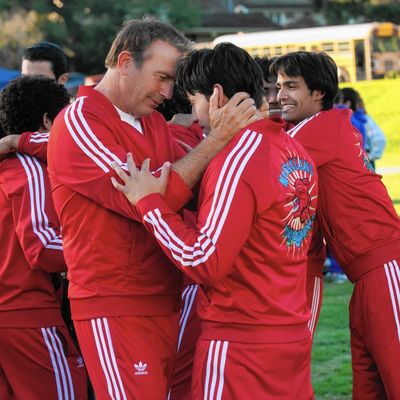
McFarland, USA is one of those inspirational underdog sports movies about never counting out unlikely contenders, and the film itself embodies that spirit. Here’s a movie that should be disposable at best, and racially condescending at worst, and yet it sticks with you. It comes by its emotions honestly and wins you over.
Kevin Costner plays Jim White, who loses a cushy gig as an Idaho high school football coach after throwing a cleat at a mouthy player, and winds up in a seemingly dead-end job teaching life sciences and P.E. in working-class, largely Hispanic McFarland, California — one of the poorest towns in the country. He hates it there, and nobody seems to want him. “Diez, is that a popular name where you come from?” he snidely asks during attendance his first day, after noticing that three of the kids share the same last name. “White, is that a popular name where you come from?” is the perfect reply. “Maybe Dad will lose it again and we’ll get to move somewhere else,” his teenaged daughter hopes fervently.
But Jim starts to notice something about these kids: They’re fast. They’re fast because they don’t have cars or bikes and they need to get around. They’re fast because they wake up at the crack of dawn to rush to work in the fields, then run back to school, then sprint back to the fields. So, he forms a cross-country squad and enlists some of the fastest kids at school to join up. They don’t know the first thing about running cross country; that’s okay, because he doesn’t know the first thing about coaching it. Running is seen as a prep-school sport, and they get clobbered in their first meet, losing out to a team of young Val Kilmers. But in case you hadn’t realized it yet, McFarland, USA is based on a true story, and our heroes are about to make California high school sports history.
This movie should be terrible — a predictable White Savior flick about a pasty, middle-aged guy teaching life lessons to a group of Mexican-American kids who don’t know better. And yet, it isn’t. Though the film is told largely from the perspective of Jim, it’s filled with a genuine sense of community. Director Niki Caro (a Kiwi filmmaker who, some years ago, made the excellent Whale Rider) depicts the White family’s initial fear of McFarland by isolating them within the frame; early on, we see Jim and his wife Cheryl (Maria Bello) discussing whether they can continue to live in this place, while we hear the menacing thrum of low-riders and trucks outside their home. But as the Whites learn more about these folks, and start to become part of the town, the compositions open up, the framing becomes more generous, and a certain warmth takes over.
Throughout, the script makes sure to keep the kids on an even footing with their coach. Unlike many other efforts in this genre, this isn’t a movie about teaching a bunch of potential hoodlums how to be better people — even though there is a jail around the corner, and a lot of these kids’ brothers and fathers have wound up there. The film takes the time to explore these kids’ troubles, but doesn’t come away with easy value judgments. Nobody needs to be redeemed in this movie. One boy winds up with a black eye, not because of domestic abuse, but because he was trying to keep his father from punching a wall in frustration. “If he hurts his hands, he can’t work,” the kid tells Jim. A trio of brothers are held back from the team by their foreman-father, who needs them to help out in the fields to put food on the table. Again, the decision is seen as an honorable one — not the choice of a man who doesn’t get the importance of running, but that of someone who knows the ruthlessness of hunger and desperation. And all throughout, Caro seems genuinely interested in these characters — in their lives, in their faces, and in what they have to say. Is McFarland, USA predictable, sanitized, and occasionally simplistic? Sure. But it’s also proof that even the most debased of genres can be salvaged with a little thought, depth, and sensitivity.


